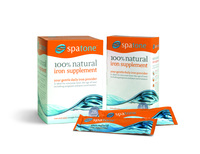Eating for pregnancy: Dispelling the myths

A new report finds that a staggering 78% of women still believe the old wives tale that Guinness is a good source of iron when in fact it contains no more iron than standard beer and you would need to drink a whopping 49.3 pints to get your daily RDA.
With the wealth of different nutritional information available it can be difficult to sort the fact from the fiction. For mums-to-be this can give huge cause for concern, especially as diet plays such a vital role in ensuring the health of their baby. So, what should pregnant women really eat and drink to ensure they are giving their baby the best start possible?
Spatone has teamed up with nutritional therapist Joanna Lyall to launch a new interactive online pregnancy nutrition checker to help women get pregnancy nutrition advice. The nutrition checker allows mums-to-be to select individual food groups and receive personal nutrition recommendations based on answers to simple questions about their daily nutrition. “The online nutrition checker is a quick and simple way to check you are eating enough of the right foods during pregnancy. Because the information is tailored to your personal responses the recommendations are straightforward and easy to follow, allowing you to choose the nutrients and vitamins for you and your growing baby”, comments Therapist Joanna Lyall.
Guide to healthy eating in pregnancy
A downloadable ‘Guide to healthy eating in pregnancy’, in association with midwife and lecturer Maggie Evans, which dispels some of the myths around what you can and can’t eat when pregnant is also available online. Maggie Evans comments, “This downloadable leaflet contains information for mothers-to-be on why a carefully balanced diet is important for their unborn baby. It also addresses how to combat pregnancy discomforts via diet and how particular cravings can identify a lacking of certain nutrients.”
Cravings and lacking in nutrients
Many pregnant women will experience cravings, such as ice cream and pickles, or even some non-food items such as dirt or coal! Some experience irrepressible cravings for chocolate and this could mean that they may be lacking in iron. But where as dark chocolate in particular, can be a useful source of magnesium and iron, milk chocolate actually tends to inhibit the absorption of iron due to the calcium content.
There is also a condition called Pica, where a person craves and consumes non-food substances, such as coal, dirt, laundry soap, starch, hair, and matches*. The name Pica, comes from the Latin word Magpie, a bird known to eat nearly anything. There are several theories about Pica – including some about it being linked to iron deficiency or to other elements missing from your diet. However not every person with Pica has a nutritional deficiency.
Iron – a key nutrient during pregnancy
During pregnancy the demand for iron is increased as the foetus and placenta need their own supply of iron which can only be obtained from the mother. In addition to eating iron rich foods, mothers-to-be can top up their iron intake with Spatone.
Spatone is a unique 100% natural liquid iron supplement** containing spring water sourced from the Welsh mountains of Snowdonia National Park - which can help top up your iron levels. Spatone can provide iron with none or fewer of the unpleasant side effects experienced with conventional iron supplements. Generally, iron is a very difficult mineral for the body to absorb. However, Spatone has been shown to have 40% bioavailability, compared to only 5 - 20% from food and other iron supplements. This means that you only need to take 1-2 sachets during pregnancy to fulfil the body’s requirement for (absorbed) iron.
The interactive pregnancy nutrition checker and downloadable ‘Guide to healthy eating in pregnancy’ are both available free at spatone.com.
Spatone is available from Boots, Holland & Barrett, Lloyds Pharmacies and independent health food stores and pharmacies, price £6.95 for 28 sachets (4 weeks supply).
If pregnant or breast feeding always contact a healthcare professional before taking any food supplement.
* Eating non-food items is to be avoided - if in any doubt, contact your GP or midwife
** It is important to follow a varied and balanced diet and healthy lifestyle. Food supplements should not be used as a substitute.


